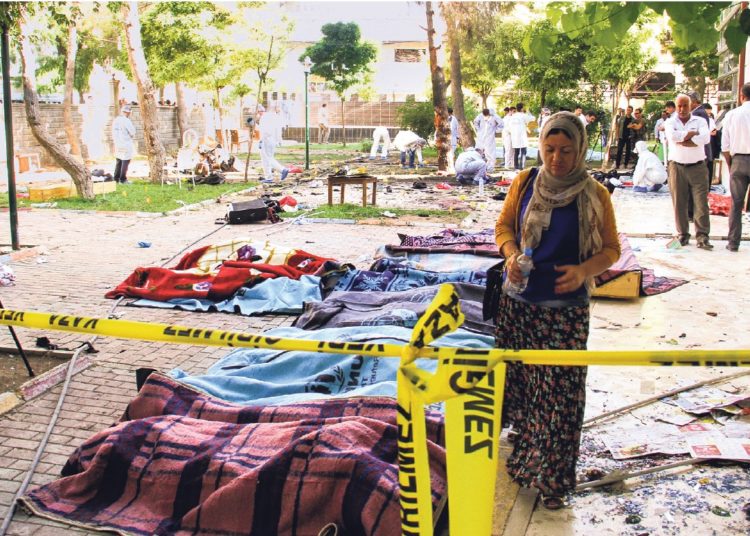Abdullah Bozkurt/Stockholm
Police chief Rüştü Yılmaz, who was implicated in one of the deadliest terrorist attacks perpetrated by an Islamic State in Iraq and Syria (ISIS) suicide bomber, was rewarded with a promotion and salary bonuses.
According to documents obtained by Nordic Monitor, Yılmaz received critical intelligence on an ISIS bomber a month before the attacker killed 33 people in a Turkish border city in 2015. Yet he denied having prior knowledge in a statement given to investigators.
Şeyh Abdurrahman Alagöz, the suicide bomber who perpetrated the attack in the border town of Suruç in southeastern Şanlıurfa province, was already on a watch list after his father Zeynel Abidin Alagöz had reported him and his elder brother Yunus Emre Alagöz on May 22, 2015 in the neighboring province of Adıyaman. The father told the police that his sons had gone missing and were believed to have traveled to Syria to join radical groups. The prosecutor in Adıyaman ordered the police to investigate the brothers as terror suspects and include them on the watch list.
Acting on the prosecutor’s orders, the police in Adıyaman conveyed this information to Şanlıurfa in a letter dated June 10, 2015, asking for information on the Alagöz brothers and alerting them about their terror activities. Three days later, the alert from Adıyaman was circulated among Şanlıurfa’s districts and police units by Yılmaz, deputy police chief of the province who also headed the intelligence department.
The intelligence about the ISIS bomber was shared more than a month before the deadly attack took place:
Yet Abdurrahman Alagöz managed to blow himself up on on July 20, 2015 in an attack that killed mostly Kurds who had gathered to show solidarity with Syrian Kurds fighting against ISIS. The attack mainly targeted members of the Federation of Socialist Youth Associations (SGDF), Kurdish socialists who planned to contribute to efforts to rebuild the Syrian border town of Kobani, largely destroyed after a battle in which ISIS was pushed out.
After the incident, Yılmaz told investigators that he had not received information about Abdurrahman Alagöz as a bomber before the attack from any security branches of the government. In the statement he gave on July 28, 2015, he said looked up the name of the bomber only after the attacker’s national identity card was found at the blast scene. The data on the intelligence department’s networks showed Abdurrahman Alagöz was already flagged. He never mentioned that he had received intelligence about the bomber more than a month before the attack and did not recall a document that bore his own signature and alerted all police units about the bomber.

Yılmaz also claimed the police have no jurisdiction in areas beyond Turkish borders and that the bomber was suspected to have gone to Syria. That was why his movements and activities could not be monitored, he claimed.
President Recep Tayyip Erdoğan, the prime minister at the time, removed many senior police chiefs in border provinces after his government’s secret and illegal arms shipment to a jihadist group in Syria by Turkish intelligence agency MIT was intercepted by police and gendarmes in January 2014.
Yılmaz’s appointment to Şanlıurfa came amid a major reshuffle. He was entrusted to lead not only the intelligence bureau but also the riot police unit and served as chief of the counterterrorism unit and deputy chief of the security bureau. It was unusual for a police chief to be in charge of all four units in the province.
Police chief Rüştü Yılmaz denied having knowledge about a bomber although he had circulated an alert about the bomber a month before the attack:
As soon as he began working at his new post, Yılmaz abruptly and summarily removed 85 intelligence officers out of 115 who had been keeping tabs on terror networks and jihadists in Suruç, a key crossing point to Syria.
The documents and contradictory statements of Yılmaz lent credence to allegations that the Suruç attack was contracted to ISIS by Turkish intelligence to serve the political goals of the Erdoğan government.
The trial in the case brought more questions than answers about the masterminds of the attack.
A report prepared by the main opposition Republican People’s Party (CHP) after the attack claimed that MIT knew there was a bomb attack planned in Suruç. Families whose children joined the ranks of ISIS told a visiting CHP delegation that their children had joined ISIS with MİT’s knowledge and that the ISIS presence in the city was widely known. The delegation accused Erdoğan of turning MIT into his own intelligence service and claimed that MIT, which conducts wiretaps on Erdoğan’s orders, could not be believed to have been unaware of the attack in advance.
Yılmaz was leading the police unit in Diyarbakır province that monitored the Turkish terror group Hizbullah in the 1990s when the militant Islamist group had increased its attacks. He was removed from his position when his office failed to prevent major attacks launched by Hizbullah, which was believed to have worked secretly with the Turkish intelligence agency. Yılmaz was the subject of an investigation for dereliction of duty at the time.
After the 2015 Suruç attack, the Erdoğan government rewarded Yılmaz with a promotion to first class police chief and awarded him and his team multiple salary bonuses for their successful work in preventing terrorism.












